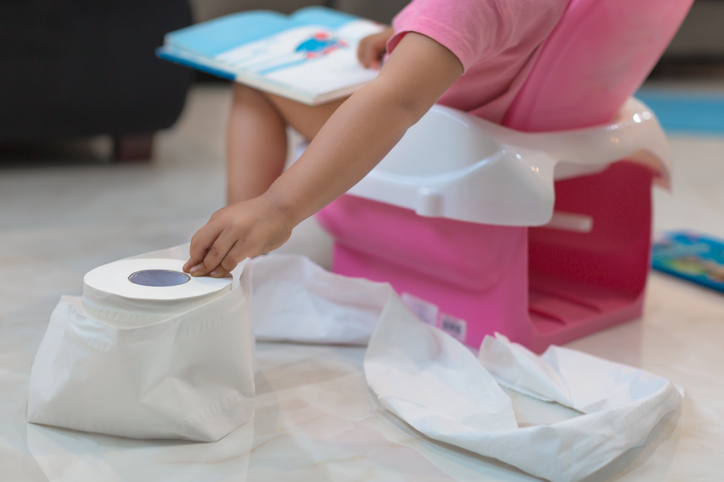Just a generation or two ago, potty training was very nearly a competitive sport, with mothers – and grandmothers – taking pride in how soon a child could use the toilet. While most of this “get em outta diapers” attitude was grounded in eliminating endless laundering of cloth diapers, the advent of disposables now makes potty training before a child is physically and emotionally ready completely unnecessary.
The American Academy of Pediatrics and your Alzein Pediatrics healthcare providers take a much more relaxed stance on potty training now and we encourage you to do so too. Waiting until your child can truly sense the urge to go, make the connection between that urge and toileting, and be able to communicate the need to toilet will make your experience happier, faster and easier for your whole family.
Is your child actually ready?
Forty years ago, most kids were toilet trained by the age of 18 months. Now, most kids are trained between 24 and 36 months – and no healthy child goes to kindergarten in diapers. For a successful potty training experience, your child should:
- Can walk, sit and stand up unassisted
- Not have bowel movements during the night while sleeping
- Be able to independently pull pants and underwear down and up again
- Shows interest in toileting, such as following you into the bathroom
- Be able to imitate behaviors
- Be able to communicate when they are “going” and when they need to “go”
Are you ready?
Take a moment and analyze your motives. Do you think your child will accept and welcome potty training, or are you getting pressure from family members? Make sure potty training is really in your child’s best interests, and no one else’s.
What should we do to prepare?
First, make an appointment with us so we can confirm your child’s physical and emotional readiness (This is a perfect opportunity to get started with telemedicine).
Make sure your family is not in the midst of stressful life changes – whether positive or negative. Don’t try to train if you’ve just moved, welcomed a new sibling or if you have a new babysitter or child care center. While it’s a “bonus” in some ways that you’re home to devote yourself to potty training, if self isolation is causing financial or emotional stress for your family, it’s not the time to train.
How do we start?
Get a potty chair. Having a chair at the right size and height makes your child feel more secure that they won’t fall off or in. Explain that’s it’s their very own toilet. Let your child get used to the potty chair before you encourage them to actually use it, even if that means sitting on it fully clothed.
It might help to take the stool from your child’s diaper and put it into the potty chair so they can understand that’s where “poop” should go.
Make this a natural experience. When you sit on the toilet, encourage your child to sit on their potty. Both boys and girls should learn to both urinate and have bowel movements sitting down at first.
Start slowly, encouraging your child just once a day, perhaps in the morning or at bath time. Make sure your child is wearing pants or clothing that is easy to remove.
Pay attention to physical signs your child is having a bowel movement – bending, grunting, or pushing – and encourage your child to use the potty at these times.
If your child goes when reminded, asks to go or goes without a reminder, reinforce this positive behavior with praise, applause, stickers, calls to Grandma, a special story – anything to make this a memorable, happy experience.
When going unprompted occurs more regularly, ask your child if they are ready to try regular underwear.
Accept that your child may not want to flush, as some kids find this frightening.
What should we avoid?
- Avoid negative comments when an accident happens. Wash, dry and change your child quickly.
- Never use staying in a dirty diaper or underwear as a punishment.
- Don’t force your child to sit on the potty for any period of time.
We’re just not having success. Now what?
Call us at 708-424-7600 or click here to request an appointment you can also visit Our Evergreen Park, Oak Lawn/95th Street, and Urgent Care locations. Your Alzein Pediatrics healthcare provider can help troubleshoot what’s working and what isn’t and what the underlying issue might be. We are here to help you help your toddler develop into a healthy, happy child.


